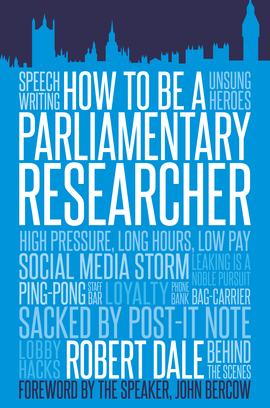 Thousands of young people every year apply to work as an MP’s parliamentary researcher. It’s a glamorous role: you’re based at the heart of the Westminster Village; you see famous politicians and celebrities on a daily basis; and you’ll have the power and responsibility to exert significant influence over the Member of Parliament you work for.
Thousands of young people every year apply to work as an MP’s parliamentary researcher. It’s a glamorous role: you’re based at the heart of the Westminster Village; you see famous politicians and celebrities on a daily basis; and you’ll have the power and responsibility to exert significant influence over the Member of Parliament you work for.
Other books that Biteback have published have added to the air of intrigue and mystique about those who work for MPs. Power Trip by Damian McBride is especially brilliant, and I know many political staffers who have found it to be hugely resourceful and informative.
However, How to Be a Parliamentary Researcher is the first book to take a close look at the work of a parliamentary researcher. So: who are they; what do they do; and how can you beat the competition to become one?
In short, the role requires you to do a bit of everything. From speechwriting and media relations to diary management, bag-carrying, overseeing your MP’s Facebook page and Twitter account, and running their errands. It’s different, exciting and fast-paced every day. More importantly, though, parliamentary researchers are playing a hugely important role in our democratic system: they allow their MPs to listen to, engage with and understand their constituents better than ever before. It is partly for this reason that John Bercow MP, the Speaker of the House of Commons, in his foreword to my book calls parliamentary researchers the ‘unsung heroes of the Westminster Village’.
The new parliament brings new MPs, all of whom will have been busy over the summer setting up their offices in Parliament and in their constituency, recruiting staff to work in both. Some are still going through this process – a search on w4mp (a popular space where MPs can list vacancies in their offices for free) shows there are about twenty roles currently being advertised.
Should you wish to apply to one of these positions, the MP will be looking to see that you’re committed to their party and have a genuine desire to work for them. It doesn’t matter if you don’t know everything about how Parliament works – no one does when they first start, not even new MPs.
Your commitment can be demonstrated by any work experience, campaign participation (knocking on doors, phone banking, leaflet delivering) or student politics that you may be participating in. If you don’t have experience in any of this, it would be worth getting involved in the local elections taking place in your area next May.
You must also tailor your CV and covering letter to the MP. For each role they advertise, an MP is likely to receive about 200 applicants. Every MP and their office should be thought of as a small business, with its own unique brand, targets, priorities and culture; invest some time in going through Google, the MP’s website and their record on TheyWorkForYou.
While it may be tempting to go ‘fishing’ and send your CV and covering letter to all MPs who have vacancies, you will achieve much better results if your approach to each is tailored. An MP wants to feel that you are interested in working for him or her, not just anyone who will give you a job.
Having worked in Parliament myself, I know that it’s worth putting in this extra effort. Your reward will be landing yourself a job right at the heart of British politics, and one that will support you in acquiring the skills, knowledge and friends that will form the foundations upon which to build a successful, productive and fulfilling career.
"A great resource for anyone beginning their career at the heart of British politics." – Professor Tim Bale
"This book is filled with the theoretical and practical guidance necessary to help demystify Parliament and make it more accessible to anyone who aspires to work at the heart of our vibrant democracy." – The Speaker, John Bercow MP
How to Be a Parliamentary Researcher by Robert Dale is available at the Biteback Publishing website and Politicos.co.uk under our two week price promise!
